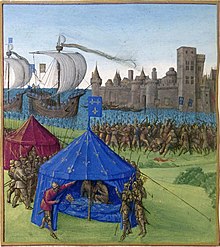Wikipedia:WikiProject Military history/News/October 2019/Book reviews
|
The Oarsmen - Scott Patterson |

![]()
![]()
![]()
![]()
![]()
- By Hawkeye7
When the Great War ended, some 200,000 Australians remained in Europe. Keeping them occupied while they waited for transports to take them back to Australia was a concern of the high command. One way was education; some 12,880 soldiers and nurses completed courses of training and work experience in Europe and North America at the government's expense. Another was sports. Many athletes had joined the Army, and there were many organised sports competitions. When the Brits decided to revive the Henley Royal Regatta, which had been suspended during the war, with a special Peace Regatta open to servicemen from Allied nations. The Australians were determined not just to join in the fun, but to win. What follows is another one of those stories about a ragtag group of Aussie larrikins up against the world.
This book is written by Scott Patterson, an Australian documentary film-maker and amateur rower who researched the subject for a forthcoming documentary. Patterson knows his sport, and readers soon will too, as the book contains plenty of technical detail about rowing. This is a sports history book, not a military history book, but there is also a great deal about the war, about the men who fought it, and about the role of sport in Australian society, all deftly woven together into a narrative.
Publishing details: Patterson, Scott (2019). The Oarsmen: The Remarkable Story of the Men Who Rowed from the Great War to Peace. London: Hardie Grant Books. ISBN 978-1-74379-549-1. OCLC 1091316566.
Project Rainfall - Tom Gilling |

![]()
![]()
![]()
![]()
![]()
- By Hawkeye7
Pine Gap is the common name of a US satellite surveillance base in the centre of Australia which is jointly operated by both Australia and the United States. (For some value of "jointly".) The location in Central Australia was chosen to keep it away from prying Soviet spy ships. It has served a variety of satellites over the years, including Missions 7600 and 8300, and the Space-Based Infrared System.
This is a somewhat disappointing book. There is no detailed description of the activities and achievements of the CIA spy satellite station at Pine Gap in the heart of Australia. What it is is more of a literature search, bringing together works concerning the subject, both official and unofficial. In that sense it might be a useful addition to a library. There are no secrets revealed in the book, despite the title. The reader seeking to know more would be best advised to seek out the references.
Occasionally, the book wanders off topic, and sometimes thinks that even the most nutty conspiracy stories are worthy of mention (like the one about Harold Holt being kidnapped by a Chinese submarine).
Publishing details: Gilling, Tom (2019). Project Rainfall: The Secret History of Pine Gap. Crows Nest, NSW: Allen and Unwin. ISBN 978-1-76052-843-0. OCLC 1104072875.
Luzon 1945 - Clayton K.S. Chun |

![]()
![]()
![]()
![]()
![]()
- By Nick-D
This book on the 1945 Battle of Luzon is the 306th volume in Osprey Publishing's 'campaign' series. It was written by an academic national security expert.
Despite being one of the largest battles fought between US and Japanese forces in World War II, the campaign to liberate Luzon is fairly obscure. This slim mass-market book helps to fill this gap by providing a useful summary of the battle. It packs a lot into its small size, and covers both Allied and Japanese plans, orders of battle and perspectives on the fighting. As is standard for Osprey books, it's also well illustrated.
That said, there are some significant flaws. The most serious is the lack of a map showing the course of the campaign - as it was fought over an area little-known outside the Philippines and involved complex maneuvers, this is inexcusable. For no sensible reason, a two-page 3D map of the main US landings is included, despite the text stressing how uneventful this was, so it's not like there was a shortage of space. The book's coverage of the perspectives of Filipino civilians and fighters is also overly brief, and there's no mention at all of the small contingents from other Allied countries who took part in the campaign. (These included an Australian naval task force and a Mexican fighter squadron.)
Publishing details: Chun, Clayton K.S. (2017). Luzon 1945: The final liberation of the Philippines. Oxford: Osprey Publishing. ISBN 9781472816283.
Recent external reviews |

Lower, Michael (2018). The Tunis Crusade of 1270: A Mediterranean History. Oxford: Oxford University Press. ISBN 978-0-19-874432-0.
- Hagler, Aaron (September 2019). "Review of Lower, Michael, The Tunis Crusade of 1270: A Mediterranean History". H-War, H-Net Reviews.
Connelly, Mark; Goebel, Stefan (2018). Ypres: Great Battles. Oxford: Oxford University Press. ISBN 9780198713371.
- Haultain-Gall, Matthew (10 October 2019). "Review of Ypres: Great Battles". Reviews in History. School of Advanced Study, University of London.
Snowdon, Edward (2019). Permanent Record. London: Pan Macmillan. ISBN 9781529035667.
- Naughton, John (23 September 2019). "Permanent Record by Edward Snowden review – gripping spy story". The Observer.
|

